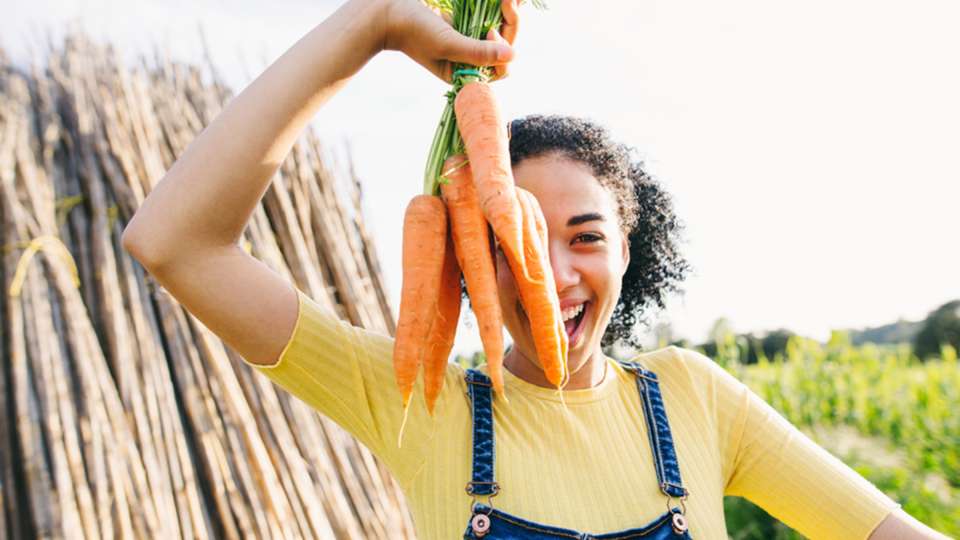
So, you want to go vegan—except you’re a little unsure how. You’ve heard rumors that vegan diets are protein-deficient and lacking all kinds of essential vitamins, and now you’re wondering if there’s a way to eliminate animal products without sacrificing your nutrition.
While it’s true you’ll need to pay more attention to the vitamins and minerals you’re getting, it’s not true that vegans can’t eat nutritiously.
“Rarely are vegans deficient in protein. People can follow a vegan diet and get everything they need,” says Molly Haas, M.S., R.D., a clinical dietitian at Harborview Medical Center.
Ready to take the plunge? Consider this Veganism 101.
Reap the health benefits
Veganism has been shown to help with everything from high blood pressure to your gut microbiome, and may protect people from chronic disease.
This isn’t due to eliminating animal products, per se, but because vegans tend to eat more fruits and vegetables while not eating the potentially harmful amounts of animal products that some non-vegans eat.
Karen Munger, M.S., R.D., C.D., a certified diabetes educator and registered dietitian at UW Medical Center - Northwest, uses the example of “blue zones,” areas in the world where people live significantly longer. The one thing all those people tend to have in common? They eat a lot of plants.
“Eating a plant-based diet has a significant relationship to longevity,” Munger says.
Going vegan can also be helpful for people who have chronic medical conditions, Munger says. She works regularly with patients who have diabetes, heart disease or even kidney stones and says she wouldn’t discourage any of them from eating a more plant-based diet.
Ease into it
First things first: If you want to go vegan, you should ease into it rather than change your diet dramatically all at once.
Eating more vegetables and fruits, as you should be with a healthy vegan diet, means you’re getting more fiber—which means you’ll likely experience some bloating or gas or will need to go to the bathroom more often. This is a normal part of switching to a high-fiber diet and shouldn’t last long.
“Once the body adjusts to having more fiber, the symptoms will go away,” Haas says.
You may also feel more tired, which could be a sign you aren’t getting enough iron.
Get your vitamins
Going vegan won’t make you malnourished, but there are several nutrients you should keep an eye on once you switch to a plant-based diet. Iron is one of them.
“Iron is always tough to get enough of because the fibers in plant-based foods hinder iron absorption in the gut,” says Munger.
To get more iron, eat more beans, legumes and whole grains. You can also find iron in dried fruit and some fortified cereals. Cooking with a cast-iron skillet can add a little extra iron to your diet, too.
Dietitians recommend getting seven to 18 mg of iron per day. This can be harder than you’d think, since iron isn’t always absorbed properly in the gut—and things like fiber, which is plentiful in produce, can interfere with its absorption.
Haas has a trick to help with this.
“Eating iron with vitamin C is a way to help your body absorb the iron. So you could have an orange with iron-fortified cereal for breakfast, and the vitamin C in the orange will help you absorb the iron,” she says.
Calcium and vitamin B12 are also important for vegans to monitor. Calcium is commonly found in animal products like milk and cheese but is also in soy and leafy greens like broccoli and kale. Vitamin B12 is typically only found in animal products, but is sometimes added to non-dairy milks like soy or almond milk, as well as nutritional yeast. You can also take a vitamin B12 supplement.
Adults should get around 1,200 mg of calcium and 2.4 micrograms (mcg) of vitamin B12 per day. If you’re concerned about your calcium and B12 levels, talk with your doctor about getting a blood test.
And then, of course, there’s protein. Beans, legumes, nuts, whole grains, soy and meat alternatives like tofu all have protein in them. As long as you’re eating these kinds of protein-rich foods, you should be fine.
The key, both Haas and Munger stress, is to balance your diet with different nutrient-rich foods and make sure you eat at least one of those foods with each meal.
Don’t be a “junk food vegan”
Take note that veganism and healthy eating aren’t one and the same. You can still eat a lot of junk food and call yourself a vegan.
“You can still have things like sugar, salt and oil if you’re vegan, but you should eat them in moderation,” Haas says.
That’s why it’s important to focus on whole and minimally-processed foods, both Haas and Munger say.
Munger likes to call this “eating closer to the farm.” That is, eating food that looks like its source and hasn’t been processed much—for example, eating mashed potatoes instead of french fries.
Ultimately, if you want to go vegan, you should do so because you want to eat more plants or because you want to protect animals, not just because it’s a trend.
“It doesn’t matter what trendy word you use: If you want the health benefits, you’ve got to eat whole foods,” Munger says.
Editor’s note: This article has been updated to reflect Northwest Hospital is now UW Medical Center - Northwest, a second campus of the University of Washington Medical Center in Seattle.

 Healthy ideas for your inbox
Healthy ideas for your inbox





